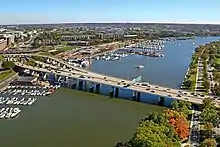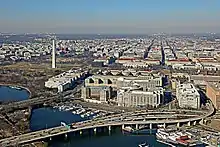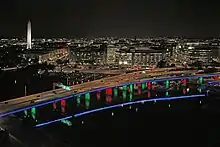Francis Case Memorial Bridge | |
|---|---|
 Francis Case Bridge carrying I-395 over Washington Channel in Washington, D.C. in 1973 | |
| Coordinates | 38°52′50″N 77°01′52″W / 38.88056°N 77.03098°W |
| Carries | Motor vehicles, pedestrians, cyclists |
| Crosses | Washington Channel |
| Locale | Washington, D.C., U.S. |
| Named for | Francis Case |
| Owner | District Department of Transportation |
| Preceded by | Charles R. Fenwick Bridge |
| Characteristics | |
| Design | Beam bridge |
| Total length | 1,578.2 feet (481.0 m)[1] |
| Width | 99.4 feet (30.3 m) |
| No. of lanes | 8 |
| History | |
| Construction cost | $8 million |
| Opened | 1962 |
| Rebuilt | 1993-1995 |
| Statistics | |
| Daily traffic | 150,600[1] |
| Toll | Free both ways |
| Location | |
The Francis Case Memorial Bridge is a steel beam bridge carrying Interstate 395 (I-395) over the Washington Channel in Washington, D.C. It is an eight-lane bridge with a bicycle/pedestrian lane on the inbound side. It has two spans that split into three on the north side of the channel. The bridge is often considered to be part of the "14th Street Bridges," but is also not counted among the five bridges in that group.
History
Though a Washington Channel Bridge had been proposed as far back as 1931, planning for the bridge that was built wasn't started until 1952 and all of the bridge's elements weren't completed until the 1970s.[2] In the early 1950s planners recognized the need to connect the planned Southwest Freeway in DC with Shirley Highway in Arlington to serve as part of the inner loop. This would require new bridges across the Potomac and the Washington Channel. The original 1952 proposal was to build a bridge in a straight line from 10th an F to Roaches Run. It required closing multiple blocks of Virginia Avenue to build a half circle south of Independence Avenue - thus creating a new Smithsonian site, rebuilding 10th Street and removing numerous structures.[3] By 1955, a proposal from NCPC shifted the Potomac Bridge north to 14th Street, necessitating an S-curve across the Channel Bridge and the highway on East Potomac Island. Despite opposition from the National Park Service to running the highway so close to the Lincoln Memorial, this is the design that was eventually approved.[4] After additional planning and approvals, Federal and District officials broke ground for the $8 million Washington Channel Bridge on August 20, 1959, though work on the piers had started earlier that summer.[5][6] During construction they moved the historic Maine Avenue fish market to make room for the bridge.[7] The bridge, along with the 12th Street Expressway, opened on July 31, 1962.[8] When South Dakota Senator Francis H. Case died a little more than a month before the bridge opened, a bill was introduced to rename the bridge for him in honor of his role as an architect of the 23rd Amendment which granted DC residents the right to vote for Electoral College electors, and for his years of service on the Senate Committee on the District of Columbia.[9] The bill passed in 1965 and the bridge was renamed.[10]
The pedestrian/bike ramp to the bridge was originally just an elevated switchback that ended on a grassy area between the sidewalks of Maine Ave and the Southwest Freeway. In 1971, Banneker Circle was altered and a causeway was designed to run between the circle and the Case Bridge switchback. At the time of the 1971 work, the causeway was contracted but it wasn't completed until sometime between 1973 and 1982.[11][12] The work included removing a section of the northwest wall to create an access for the causeway.[13] The elevated paved causeway has mortared granite cladding in an ashlar pattern and is built up as high as 15 feet where it connects to the switchback ramp. Where this causeway ramp rises from grade, it is lined with a five foot tall galvanized railing on either side.[14] In 2018, in order to connect L'Enfant Plaza to the new Wharf Development across Maine Avenue, the causeway was redesigned again. Where the causeway is at grade, a landing was added which connects to a wide staircase down to Maine Avenue; more of the northwest wall was removed to create a better connection and a curb ramp was added down to the circle.[15]
The bridge was rehabilitated from October 4, 1993 to September 20, 1994. The work replaced the bridge decking.[16][17]
References
- 1 2 "Francis Case Memorial Bridge". Bridge Hunter. Retrieved 23 May 2019.
- ↑ Zagoria, Sam (1 February 1952). "Cent Boost In Gas Tax Urged to Pay Part of Bill". The Washington Post.
- ↑ "Highway Planners Propose New Way Into Southwest". The Washington Post. 16 September 1952.
- ↑ Albrook, Robert C. (24 March 1955). "Road-Bridge Proposal Based On South Mall Sent Planners". The Washington Post.
- ↑ "Groundbreaking for $8 Million Span". The Washington Post. 20 August 1959.
- ↑ "A Pile of Trouble in the Washington Channel". The Washington Post. 27 June 1959.
- ↑ "Last Fish Dealers Agree to Move". The Washington Post. 13 Feb 1960.
- ↑ "Washington Channel Bridge to Open This Afternoon". The Washington Post. 31 July 1962.
- ↑ "Bridge, Expressway Will Open July 31". The Washington Post. 22 July 1962.
- ↑ "Designating the bridge crossing the Washington Channel near the intersection of the extension of Thirteenth and G Streets Southwest the "Francis Case Memorial Bridge". No. 89-203 of 25 September 1965 (PDF). US Congress.
- ↑ " A photo from 1973 and a map from 1982 show the Circle without and with the causeway." Swanson, Dick (April 1973). "Southwest Washington, D.C. With South End Of L'Enfant Plaza In Foreground, Southwest Freeway, Department Of Agriculture And Washington Monument Beyond, April 1973". Flickr.com. Retrieved 22 July 2019.
- ↑ Getting Around Washington by Bike (PDF). DDOT. August 1982. Retrieved 11 June 2021.
- ↑ Grubisich, Thomas (13 September 1973). "Hidden Hazards Await Bicyclist: Bike Hazards Abound -- On Roads and Trails". The Washington Post.
- ↑ "Benjamin Banneker Park (10th Street Overlook) National Mall & Memorial Parks - Miscellaneous Reservations". National Park Service. Retrieved 19 July 2019.
- ↑ Cranor, David (26 April 2018). "New stairs, ramps, bike lanes, and crosswalks make for better connections to the Wharf". Greater Greater Washington. Retrieved 4 October 2019.
- ↑ Fehr, Stephen C. (27 September 1993). "Well-Worn Case Bridge To Get Yearlong Face Lift". The Washington Post.
- ↑ Schaffer, Ron (24 November 1994). "In Gratitude For Easier Rides". The Washington Post.



